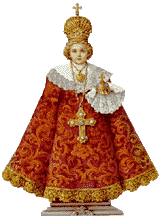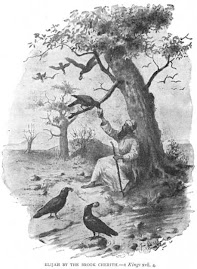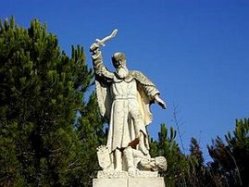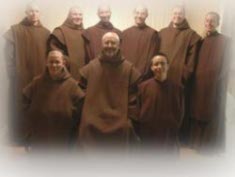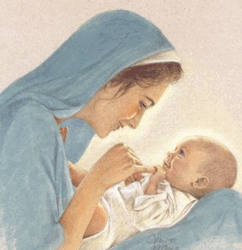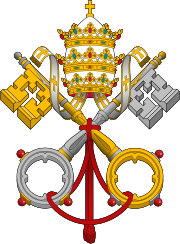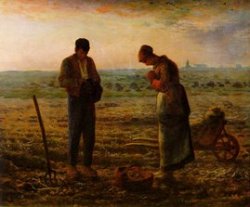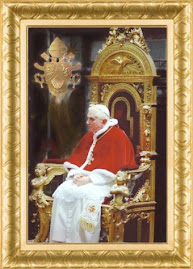 GOSPEL (John 6: 1-15)
GOSPEL (John 6: 1-15)At that time, Jesus went over the sea of Galilee, which is that of Tiberias; and a great multitude followed him, because they saw the miracles which he did on them that were diseased. Jesus therefore went up into a mountain, and there he sat with his disciples. Now the pasch, the festival day of the Jews, was near at hand. When Jesus therefore had lifted up his eyes, and seen that a very great multitude cometh to him, he said to Philip: Whence shall we buy bread that these may eat? And this he said to try him; for he himself knew what he would do. Philip answered: Two hundred pennyworth of bread is not sufficient for them, that every one may take a little. One of his disciples, Andrew, the brother of Simon Peter, saith to him: There is a boy here that hath five barley loaves and two fishes: but what are these among so many? Then Jesus said: Make the men sit down. Now there was much grass in the place. The men therefore sat down, in number about five thousand. And Jesus took the loaves; and when he had given thanks, he distributed to them that were set down: in like manner also of the fishes, as much as they would. And when they were filled, he said to his disciples: Gather up the fragments that remain, lest they be lost. They gathered up, therefore, and filled twelve baskets with the fragments of the five barley loaves, which remained over and above to them that had eaten. Now those men, when they had seen what a miracle Jesus had done, said: This is of a truth the prophet that is to come into the world. Jesus therefore when he knew that they would come to take him by force, and make him king, fled again into the mountain himself alone.
Why did Christ try St. Philip?
To test his faith and confidence; to instruct us that before seeking supernatural means, we should first look for natural ways of providing; that the miracle of the multiplying of the loaves should be more marvellous to the people from having seen there was no provision; and that we may learn to trust in God, who is a helper in due time in tribulation. (Ps. 9: 10)
What signs did Christ make use of in this miracle, and why?
According to St. Matthew (14: 19) He lifted up His eyes to heaven, by which He showed that all good gifts come from above; He gave thanks, thus teaching us to give thanks to God for all His blessings. "The table," says St. Chrysostom, "that is approached and is left with prayer will never know want, but the more richly yield its gifts." He blessed the bread showing us that the divine blessing increases all things.
Why did Christ require them to gather up the fragments that were left?
That they should not be wasted or destroyed; that the greatness of the miracle should be made evident by the quantity of the fragments; and that we might learn to honor the gifts of God, even the most insignificant, and if we do not ourselves need them, give them to the poor.
Why did Christ, after this miracle, flee from the people?
Because after this miracle the people recognized in him the Messiah, and would have made Him king. He wished to teach us to flee from praise and honor, and in all our actions seek not our own, but God's glory.
CONSOLATION IN POVERTY
This gospel gives the account of Christ providing for those who followed and listened to Him, which is indeed consoling for the poor. God from the beginning of the world has always cared for His own. For the aid and comfort of His chosen people in time of famine God sent Joseph, the son of the Patriarch Jacob, in advance into Egypt: (Gen. 45: 5) for forty years He fed the children of Israel in the desert with bread from heaven; (Deut. 8: 2, 3) He fed the Prophet Elias by a raven; (3 Kings 7: 6) and thought of Daniel in the lions' den. (Dan. 14: 37) In the New Testament God shows His merciful care for His own, because in great need He fed them marvelously through angels, men, and even animals, as we frequently see in the lives of the saints. Truly has David said: God forsakes not the just, I have been young, and am now old: and I have not seen the just forsaken, nor his seed seeking bread, (Ps 36:25) that is, one who sincerely serves Him, and seeks before all the kingdom of God and His justice, as Christ commands. (Luke 12: 31) Strive to be a faithful child, and you will have God for your father, and with King David you can cast your care upon the Lord, and He will sustain you. You must not think it is enough to pray and trust in God, He demands that you should use your strength to receive help, for if any man will not work, neither let him eat. (2 Thess. 3: 10)
ASPIRATION
In Thy omnipotence and goodness, O my God, I put my trust, firmly believing that if I fear Thee, serve Thee faithfully, and avoid evil, I shall not be abandoned in poverty, but receive many good things. Amen.
INSTRUCTION ON PREPARATION FOR EASTER
Now the Pasch the festival day of the Jews, was near at hand (John 6: 4)
If we would sing a joyful Alleluia with the Church on the festival of Easter, we must fulfill her desire, and prepare ourselves to celebrate it worthily. Therefore, we should shun improper, clamorous meetings, and retire often to pray in solitude, especially to meditate on the bitter sufferings of our Saviour, for when man is alone, God speaks to his heart. (Osee 2:14) We should carefully examine our conscience, and consider how we stand before God, for upon this day shall be the expiation for you, and the cleansing from all your sins: you shall be cleansed before the Lord; for it is a Sabbath of rest, and you shall afflict your souls, that is, by fasting, watching, and praying (Lev 16: 30-31). From this Sunday until Easter we should fast more strictly, give more alms to the poor if we are able, or if poor ourselves, bear our poverty more patiently, offering it to Christ in union with His poverty, His hunger, thirst, &c. ; we should make a sincere and contrite confession, and purify our heart from the old leaven of iniquity, that we may keep the Easter meal with Christ in the unleavened bread of purity and truth (1 Cor 5:7-8). For this end we should incite ourselves to holy desires, rise from sin, which is the death of the soul
